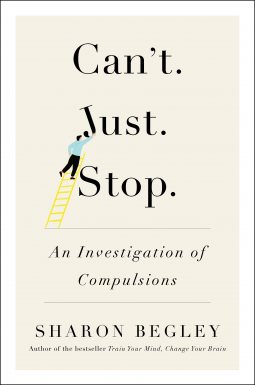
New Book Attempts to Demystify Compulsive Behaviors of All Types and Severity
By Jeff Edelstein
Compulsive behaviors, those which we are motivated but nothing more than a seemingly inexplicable need to act, make up a wider variety of actions than many typically see. Beyond conditions such as Obsessive Compulsive Disorder (OCD), some individuals may feel the need to engage in repetitive, somewhat unusual actions at work, in response to anxiety or in other scenarios. Understanding and parsing through these different situations and behaviors may seem like a daunting task, but a book published earlier this month aims to demystify them.
 Can’t. Just. Stop. An Investigation of Compulsion attempts to cover the entire spectrum of compulsive behaviors through interviews with dozens of individuals. These personal accounts, as shared by experienced writer, editor, and investigator, Sharon Begley of the Boston Globe, consist of case studies that address the intersection of compulsive behaviors and the stories of the people involved. In a brief article on The Guardian, Begley acknowledges the myriad roots of overwhelming urges and the importance of starting with the very people who experience compulsion in her journey to understand it.
Can’t. Just. Stop. An Investigation of Compulsion attempts to cover the entire spectrum of compulsive behaviors through interviews with dozens of individuals. These personal accounts, as shared by experienced writer, editor, and investigator, Sharon Begley of the Boston Globe, consist of case studies that address the intersection of compulsive behaviors and the stories of the people involved. In a brief article on The Guardian, Begley acknowledges the myriad roots of overwhelming urges and the importance of starting with the very people who experience compulsion in her journey to understand it.
“…when I got to know people who were compulsive, their behaviors didn’t seem unreasonable at all. It seemed like an understandable response to angst that would otherwise eat them alive. Second I realized that although people with the most extreme compulsions seem like outliers, the anxiety that drives those extremes is universal – and underlies milder compulsions too.”
She goes on to compare compulsions to addictions, noting that the latter are based in the influx of pleasure the activities involved (e.g. gambling, drinking), whereas impulsive behaviors are pursued without the actor putting much thought at all into them. To contrast, people may engage in compulsive behaviors to outcomes or negative stimuli that they would rather avoid. For example, some individuals may have an overwhelming urge to repeat actions over and over to reduce stress of anxiety. The bottom line: on some level, these behaviors feel necessary in the process of evading negative consequences, imagined or real.
Those interested in learning more about Begley’s work on compulsive behaviors can check out her book on Amazon and Audible, along with other sellers. Additionally, those looking to learn a bit more about how the book is being received can read reviews here and here; the overall impression seems to be that the tough terminology may deter some readers, while the person stories may draw them back in.
Begley is also the current senior science editor of STAT, the life sciences publication of the Boston Globe, and you can catch up on her articles right here. She brings years of experience with publications ranging from Reuters to Newsweek, and you can learn more about her, her work, and her other books on her website. To check out more resources related to anxiety or OCD, make sure to visit our resources page and sign up for our newsletter so you never miss a post or update, and share your thoughts with us below!
Source: The Guardian
Jeff Edelstein is currently a senior at Florida State University studying Management Information Systems and Music while researching the college experiences of adults on the autism spectrum. He will be pursuing graduate studies in higher education with a focus on supporting those on the spectrum and other students with disabilities this fall at the University of Michigan. His brother is diagnosed with PDD-NOS, and was his initial inspiration for his work. Jeff is also an avid juggler/joggler, pianist/accompanist, a novice slack rope walker, and is always eager to help others learn those skills as well.




